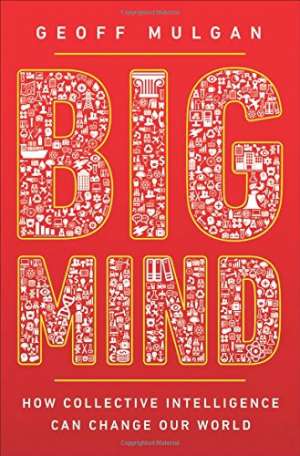09 July 2018
Big Mind
How collective intelligence can change our world
Geoff Mulgan
2017, Princeton University Press, 280 pages,
ISBN 9780691170794
Reviewer: Catherine Connolly

Big Mind is a book of big themes, big issues and big questions. The central theme of Big Mind is how collective intelligence can change our world for the better. It considers how rapid changes in technology, in combination with organising structures, can be used to effectively utilise human resources across the world to solve problems. In short, Big Mind considers how can ‘collective problems find collective solutions?’
The book begins with an overview of what is meant by intelligence and provides examples of when ‘collective’ intelligence has worked to benefit society, e.g. open-source software, the compilation of the Oxford English Dictionary and advances in medical science promoted by shared research. Mulgan then set out a theoretical framework to help understand when and how organisations or structures work to promote learning, sharing and self-critique as well as presenting organising principles for effective collective intelligence. The book concludes with a discussion of how universities, democratic assemblies, economies, cities and governments could do more to promote collective intelligence and calls for further study into collective intelligence as a distinct discipline.
For anyone who has worked in a large institution, the questions posed by the book will resonate. The introduction asks why organisations full of ‘clever people and expensive technology … nevertheless act in stupid and self-destructive ways’. There is also a section on why we can be so useless at meetings despite knowledge of what makes them effective. Indeed, I would particularly recommend Big Mind for senior managers. They stand to benefit directly from thinking about how to maximise the collective potential of their institutions and beyond.
This isn’t a book about economics but economic study and concepts are frequently referenced. Big Mind includes a call for a study of cognitive economics. Cognitive economics would involve the study of thought as involving inputs and outputs, costs and trade-offs. It would consider creativity, innovation and how best to pay for and fund collective intelligence - the benefits of which go beyond individual contributors or institutions. Cognitive economics would be relevant to debates around education as we prepare to equip people for a world where mundane tasks are done by computers.
Despite the ambitious, serious subject matter there is a lightness and readability about the book that encourages readers to reflect on their own work environments and experience of collective intelligence. Moreover, the numerous examples, quotes and personal anecdotes are key to providing something real and concrete in what can sometimes feel a slightly abstract or theoretical subject matter. For example, the idea of using computer facilitators to run meetings in response to our inability to run them well ourselves was both amusing and potentially quite sensible.
Big Mind clearly represents a great deal of thought, reading and research. I don’t doubt it was ‘several decades in the making’ as announced in the preface. In bringing together information about collective intelligence from across disciplines – economics, science, philosophy, psychology, history – and setting out the current state of knowledge Big Mind gives a flavour of how the study of collective intelligence could evolve and how we might design institutions and platforms to avoid collective stupidity.
Avoiding collective stupidity seems like a sensible thing to focus on in 2018. Big Mind doesn’t provide all the answers but by bringing together the body of research that exists and articulating the questions and key issues clearly it sets out a worthy challenge for others to build on.
